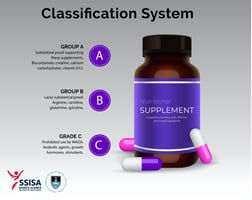In a world focused on convenience, smoothies are at the top of the list when it comes to quick...
Sensational Supplements
Have you ever walked down the supplements aisle at the local pharmacy/supermarket? What awaits is a gauntlet of brightly coloured containers claiming, in bold letters, to be the next best thing since sliced bread. From “mass gainers” to “fat burners” and much more, companies push the narrative that to achieve optimal health and fitness we must use their product. Upon closer inspection, the concerned customer reads the phrase “backed by science” which alleviates any doubts that the product works and is safe. But just because the product says it is “backed by science” does it really mean that it is?
Recently, we came across a product for teenagers that claimed to boost brain function. Their website contained a well referenced description of the ingredients as well as the scientific reason for their inclusion in this drink mix. This would be enough to ease the mind of any concerned parent looking to safely boost the brain function of their school-going teen. But as scientists (with some free time), we decided to have a read through the referenced articles to see if they backed up what was being claimed by the product.

One component of the drink mix was a specific carbohydrate with a low-glycaemic index (low-GI). The claim was that low-GI carbohydrates were found to improve attention and memory function and it was inferred that low-GI was better than high-GI carbohydrates in terms of improving brain function in teenagers. The referenced articles concluded that a low-GI breakfast did improve attention and memory in children and adolescents but that there was no difference between low- and high-GI breakfasts. The authors stated that the findings showed regularly eating breakfast to be important for brain function but the effects of GI was inconclusive1. Secondly, the article used by the company to further justify the use of low-GI carbohydrates reviewed studies involving rats, mice, and elderly humans2. These populations have vastly different physiology to that of children and adolescents and it is inappropriate to assume the findings in one population work for another. While the explanations given by the company may not be incorrect, they fail to mention the uncertainty in scientific findings and tend to misrepresent the conclusions of the researchers.
This is just one example of a much larger issue, the sensationalism of scientific conclusions for product marketing. With the “backed by science” tagline being a key differentiating factor in the saturated supplement market, there is a demand for manipulating scientific findings to fit the chosen narrative. But what’s the harm? Well, this type of marketing can lead to buying a product that simply doesn’t work or is unnecessary which is relatively harmless. But it could justify the inclusion of unknown or potentially unsafe/illegal substances which can have serious consequences.
If this example shows us anything, it is the importance of reading the evidence for the use of a product at its source to lower the risk of misrepresentation of findings. Additionally, the old saying may ring true…” If it’s too good to be true, it probably is.”
To bring you the most evidence-based and cutting information in the fields of sports and exercise science and health, SSISA works alongside the UCT Research Centre for Health through Physical Activity, Lifestyle and Sport (HPALS) to disseminate the latest research. HPALS research focuses on optimizing human performance and promoting health and well-being through physical activity, sports participation, healthy eating and good sleep hygiene. Their work begins at the DNA, to the human performance laboratory and ultimately to the community. To read more about the Health through Physical Activity, Lifestyle and Research Centre, Division of Physiological Sciences at the University of Cape Town, please see the HPALS website or email Ayesha Hendricks for more information about applications for MSc/PhD research programmes.
To get in touch with the Sports Science Institute of South Africa Group for Research Implementation and Translation (GRIT) Research Consultants, get in touch with Warren Lucas at research@ssisa.com or call 021 650 5728 for enquiries. Read more about the SSISA GRIT Team here.
References:
- Álvarez-Bueno C, Martínez-Vizcaíno V, López EJ, Visier-Alfonso ME, Redondo-Tébar A, Cavero-Redondo I. Comparative Effect of Low-Glycemic Index versus High-Glycemic Index Breakfasts on Cognitive Function: A Systematic Review and Meta-Analysis. Nutr 2019, Vol 11, Page 1706 [Internet]. 2019 Jul 24 [cited 2022 Nov 9];11(8):1706. Available from: https://www.mdpi.com/2072-6643/11/8/1706/htm
- Gold PE. Role of glucose in regulating the brain and cognition. Am J Clin Nutr [Internet]. 1995 [cited 2022 Nov 11];61(4 Suppl). Available from: https://pubmed-ncbi-nlm-nih-gov.ezproxy.uct.ac.za/7900698/


